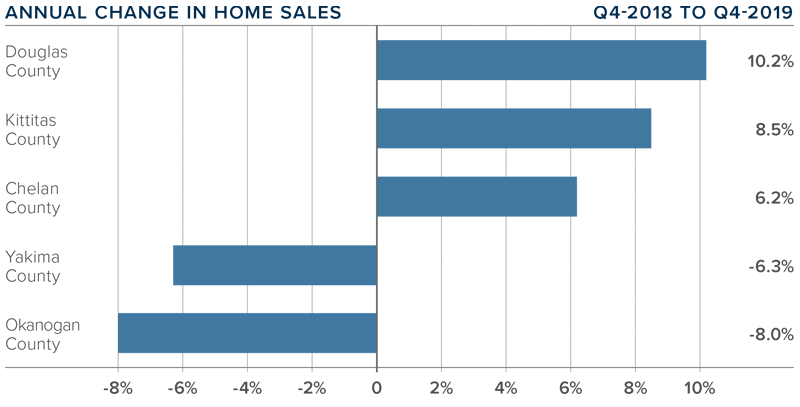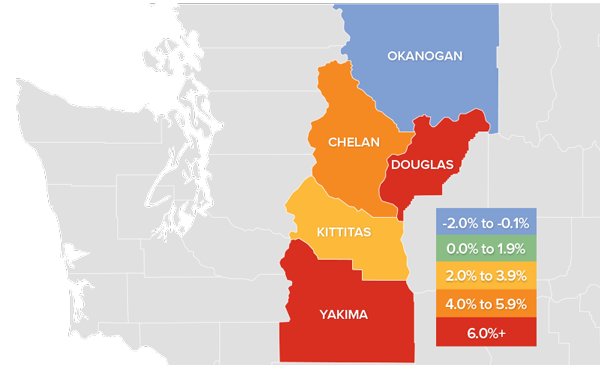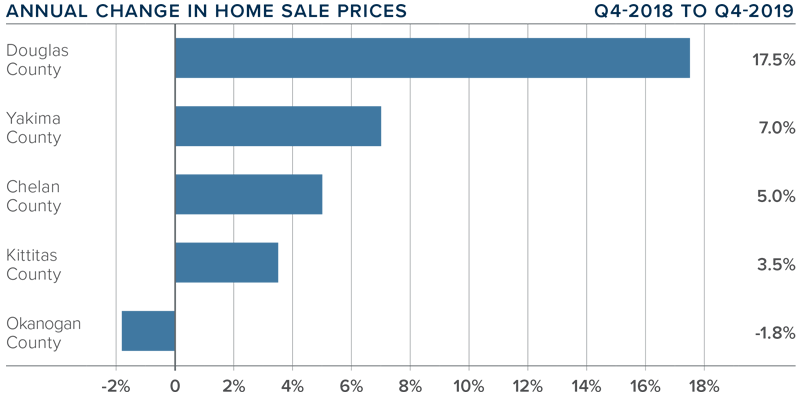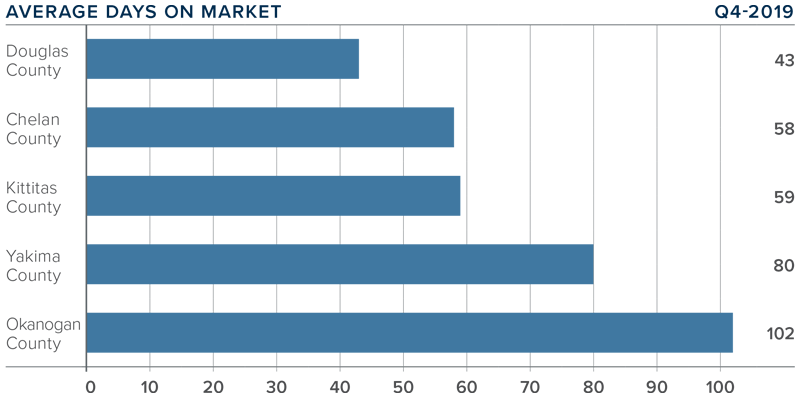The following analysis of the Central Washington real estate market is provided by Windermere Real Estate Chief Economist Matthew Gardner. We hope that this information may assist you with making better-informed real estate decisions. For further information about the housing market in your area, please don’t hesitate to contact your Windermere agent.
ECONOMIC OVERVIEW
Employment in Washington State continues to soften; it is currently at an annual growth rate of 1.7%. I believe this is a temporary slowdown and we will see the pace of employment growth improve as we move further into the new year. It’s clear that businesses are continuing to feel the effects of the trade war with China and this is impacting hiring practices. This is, of course, in addition to the issues Boeing currently faces regarding the 737 MAX.
On a seasonally adjusted basis, the counties within Central Washington added 5,116 new jobs over the past 12 months, representing a growth rate of 2.2%. The local unemployment rate rose compared to a year ago from 5.9% to 6.2%, but this is largely due to a 2.6% increase in the civilian labor force.
HOME SALES
- In the final quarter of 2019, home sales throughout Central Washington rose 0.6% year-over-year, with a total of 1,229 homes sold.
- Sales rose significantly in Douglas and Kittitas counties, which saw increases of 10.2% and 8.5% respectively. Sales rose by a more modest 6.2% in Chelan County. We saw a drop in sales in Yakima and Okanogan counties, though in absolute terms the contraction was only 41 units.
- The number of pending home sales — an indicator of future closings — was up 4.1% compared to the third quarter, indicating that closings will likely rise in the first quarter of 2020.
- Listing activity in the quarter decreased 7.8% compared to a year ago, but there was a small increase in Yakima County. I remain somewhat hopeful that buyers will see inventory levels rise in the second half of 2020.

HOME PRICES
 Year-over-year, the average home price in the region rose 7.7% to $352,643. Price growth continues to trend well above the long-term average, with limited inventory pushing prices higher.
Year-over-year, the average home price in the region rose 7.7% to $352,643. Price growth continues to trend well above the long-term average, with limited inventory pushing prices higher.- Sale prices were 2.3% lower than in the third quarter of 2019.
- Prices rose in all counties contained in this report except Okanogan. Douglas County had significant, double-digit growth compared to the fourth quarter of 2018.
- The takeaway from this dataset is that significant home-price growth continued in the quarter, but I expect to see a modest slowdown in the pace of home price appreciation as we move through 2020.

DAYS ON MARKET
- The average number of days it took to sell a home dropped three days compared to the fourth quarter of 2018.
- The average time it took to sell a home in the region was 68 days, up 10 days compared to the third quarter of 2019.
- Three markets contained in this report —Okanogan, Yakima, and Kittitas — saw days-on-market drop from the same quarter in 2018. The balance of the region took slightly longer to sell a home.
- Homes again sold fastest in Douglas County, where it took an average of 43 days to sell a home. The greatest drop in the time it took to sell a home was in Okanogan County, where it took 15 fewer days than in the final quarter of 2018.

CONCLUSIONS
 This speedometer reflects the state of the region’s real estate market using housing inventory, price gains, home sales, interest rates, and larger economic factors.
This speedometer reflects the state of the region’s real estate market using housing inventory, price gains, home sales, interest rates, and larger economic factors.
For the final quarter of 2019, I have moved the needle a little more in favor of sellers. Inventory levels remain low, and prices continue their upward trajectory. This, in concert with very favorable mortgage rates, continues to bode well for home sellers.
ABOUT MATTHEW GARDNER
 As Chief Economist for Windermere Real Estate, Matthew Gardner is responsible for analyzing and interpreting economic data and its impact on the real estate market on both a local and national level. Matthew has over 30 years of professional experience both in the U.S. and U.K.
As Chief Economist for Windermere Real Estate, Matthew Gardner is responsible for analyzing and interpreting economic data and its impact on the real estate market on both a local and national level. Matthew has over 30 years of professional experience both in the U.S. and U.K.
In addition to his day-to-day responsibilities, Matthew sits on the Washington State Governors Council of Economic Advisors; chairs the Board of Trustees at the Washington Center for Real Estate Research at the University of Washington; and is an Advisory Board Member at the Runstad Center for Real Estate Studies at the University of Washington where he also lectures in real estate economics.
 Facebook
Facebook
 X
X
 Pinterest
Pinterest
 Copy Link
Copy Link



